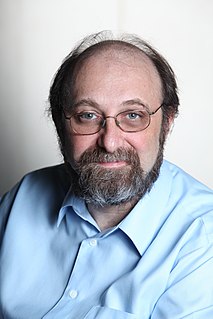A Quote by Bill Nye
Unlike science, creationism cannot predict anything, and it cannot provide satisfactory answers about the past.
Related Quotes
I conclude that, while it is true that science cannot decide questions of value, that is because they cannot be intellectually decided at all, and lie outside the realm of truth and falsehood. Whatever knowledge is attainable, must be attained by scientific methods; and what science cannot discover, mankind cannot know.
Boredom is the consciousness of repetition. Because animals cannot remember the past, they cannot feel bored. They cannot remember the past, so they cannot feel bored. They cannot remember the past, so they cannot feel the repetition. The buffalo goes on eating the same grass every day with the same delight. You cannot. How can you eat the same grass with the same delight? You get fed up.
Love is a chemical reaction, but it cannot be fully understood or defined by science. And though a body cannot exist without a soul, it too cannot be fully understood or defined by science. Love is the most powerful form of energy, but science cannot decipher its elements. Yet the best cure for a sick soul is love, but even the most advanced physician cannot prescribe it as medicine.
Consumers cannot think in abstractions. They cannot envision a new concept. They cannot predict their behavior. They can only compare against their current frame of reference. So you need to make the big leap for them. You need to provide them with a reason to buy, a reason to brag to their friends. Expect new-to-the-world ideas to fall on deaf ears. Consumers will, however, change their tune when they can see, touch, and explore.
Some of the most wonderful aspects and consequences of evolution have been discovered only recently. This is in stark contrast to creationism, which offers a static view of the world, one that cannot be challenged or tested with reason. And because it cannot make predictions, it cannot lead to new discoveries, new medicines, or new ways to feed all of us.
Sex cannot be understood because nature cannot be understood. Science is a method of logical analysis of nature's operations. It has lessened human anxiety about the cosmos by demonstrating the materiality of nature's forces, and their frequent predictability. But science is always playing catch-up ball. Nature breaks its own rules whenever it wants. Science cannot avert a single thunderbolt. Western science is a product of the Apollonian mind: its hope is that by naming and classification, by the cold light of intellect, archaic night can be pushed back and defeated.
But in the end, science does not provide the answers most of us require. Its story of our origins and of our end is, to say the least, unsatisfactory. To the question, "How did it all begin?", science answers, "Probably by an accident." To the question, "How will it all end?", science answers, "Probably by an accident." And to many people, the accidental life is not worth living. Moreover, the science-god has no answer to the question, "Why are we here?" and, to the question, "What moral instructions do you give us?", the science-god maintains silence.
Unlike return, however, risk is no more quantifiable at the end of an investment that it was at its beginning. Risk simply cannot be described by a single number. Intuitively we understand that risk varies from investment to investment: a government bond is not as risky as the stock of a high-technology company. But investments do not provide information about their risks the way food packages provide nutritional data.




































